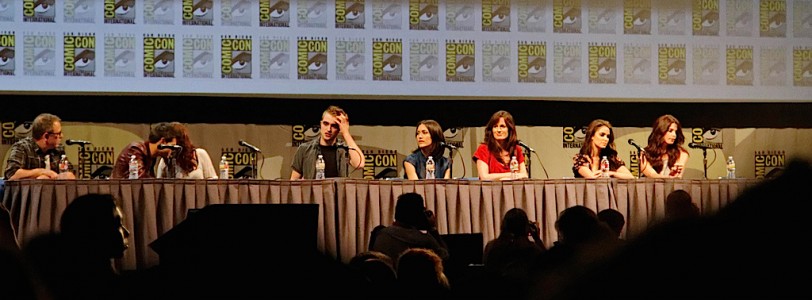Many festivals and conventions feature talks from artists, authors, professionals and even celebrities. This week we'll be heading to the Manchester International Festival, one of the more discursive contemporary festivals. Literature Festivals are almost entirely made up of talks on books and other subjects. This could be of help for people doing their Gold Arts Award who need to do a number of reviews easily: you can get multiple rundowns of multiple topics addressed at talks. Furthermore, you could get some ideas to write your Unit 1, Part D - Form a View.
- Read my coverage from the Cambridge Literary Festival and Hexham Book Festival talks and panels
However, reviewing a talk can seem more difficult than a performance or a piece of art, so here are a few tips for how to approach it:
1. Review the talk not the book/music/art
Talks are often done by artists on a particular piece of work, for example authors often do talks on their books. If this is the case, make sure you are reviewing the talk itself and not the subject. it is a good idea to think about things like the format the talk takes - is it an interview or a panel? Does this work well or not? Other things you can consider are the structure, any questions which are asked or any performances/readings done as part of the talk. Making notes during the talk can help if you are worried about remembering everything.
2. Context not commentary
The audience wants to know what the talk is about so it is good to recap key ideas. However, you should avoid giving a blow by blow of everything that was said - the aim is to review the talk and offer an opinion or perspective, not simply describe it. Scribble down the most insightful quotes. Popular talks can cover deep, philosophical topics as well as the more mundane and it's up to you to get the appropriate level of gravity across to the reader.
3. Use the audience
The audience is a great barometer for how good the talk is, so it is important to pay attention to how people are reacting. In many review writing guides, you'll be told you focus on the audience reaction. This is especially important for talks and essential for Q&As. If there are huge bursts of laughter, mention it as this proves how funny the talk was. Keep an eye and an ear out to see what the level of interest from the audience is, and if there is a question segment looking at the number of people wanting to ask a question is another good sign.
Silence can signify boredom, or can signify that the audience is enraptured. Similarly, interaction between the talker or panel and the audience may equally signify how annoyed or how enamoured they are with the discussion.
4. Be honest
Just like any other review, it is best to be honest if a talk just doesn't click with you. However try to approach it with constructive criticism - if a straightforward interview was boring you might suggest that perhaps questions from the audience might have worked well. Always try to balance the negatives with positives.
5. Round it up
Finishing the review can be the most difficult part. You can round it up by giving an overall opinion or a recommendation to see the art/read the book etc. Often a talk is a one-off so it is unusual to advertise a future talk, however if it is part of a series, or one of a festival, you may want to add further information. Furthermore, reading a recap about a talk by an influential figure may help a reader to explore that figure's work more. Who knew, for example, that Sara Pascoe was also a writer?
Like any other kind of writing all you can do is have a go - if you see any talks you want to review, you can post them right here on Voice!
- Image courtesy of Flickr/rwoan









0 Comments